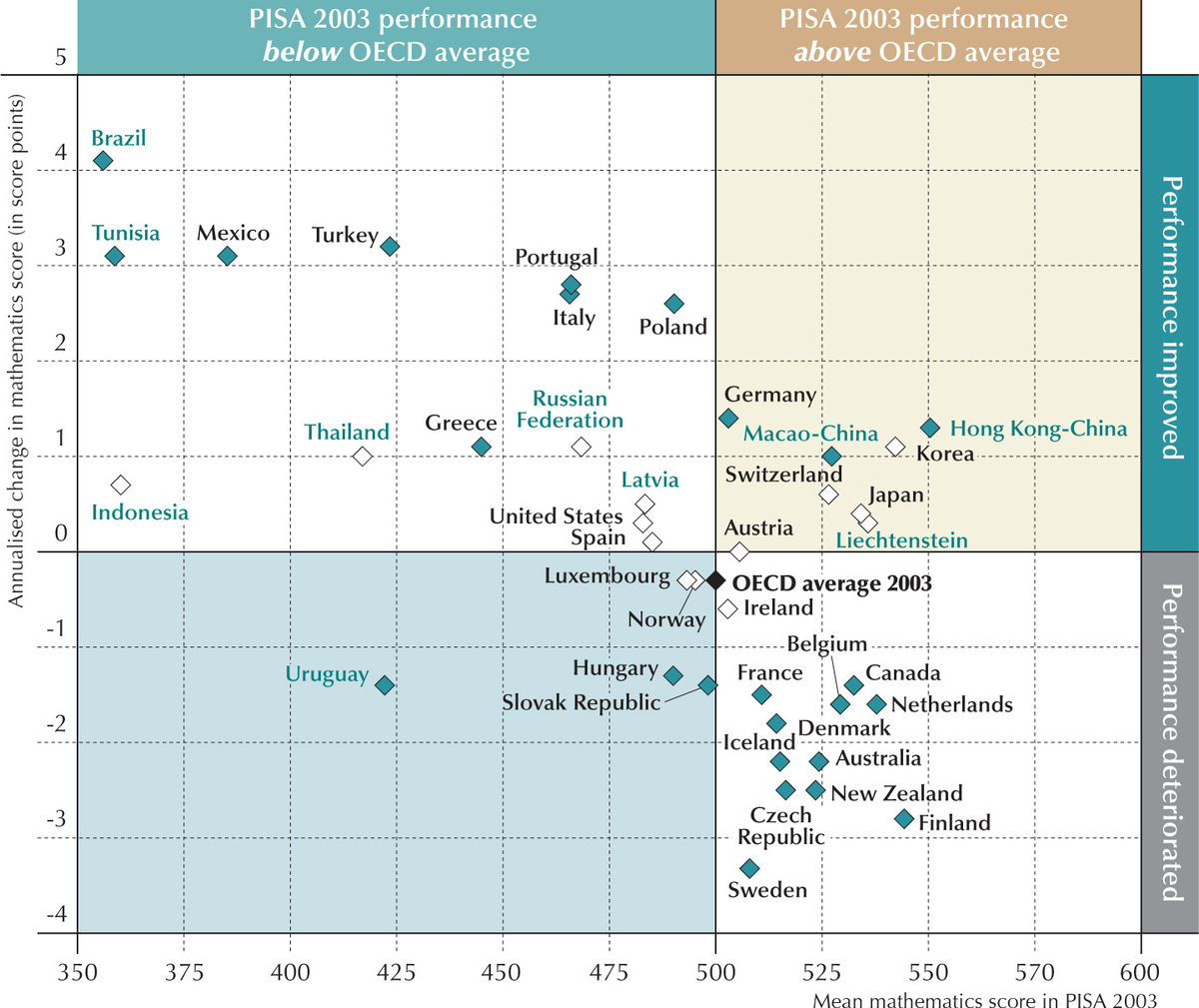United States Ranks 14th in Reading, 25th in Math, and 17th in Science (Shepard, 2010)

A graphic released with the 2012 PISA results shows the annualized alter in performance in average math scores betwixt 2003 and 2012. The chart includes just nations that have comparable data from both 2003 and 2012. PISA hibernate explanation
toggle explanation
PISA

A graphic released with the 2012 PISA results shows the annualized modify in operation in boilerplate math scores between 2003 and 2012. The chart includes only nations that have comparable data from both 2003 and 2012.
PISA
American 15-year-olds proceed to plow in apartment results in a test that measures students' proficiency in reading, math and scientific discipline worldwide, failing to crack the global acme xx.
The Program for International Student Assessment, or PISA, collects test results from 65 countries for its rankings, which come out every iii years. The latest results, from 2012, show that U.S. students ranked below average in math among the earth's nigh-developed countries. They were close to average in science and reading.
"In mathematics, 29 nations and other jurisdictions outperformed the United States by a statistically meaning margin, up from 23 three years ago," reports Education Week. "In science, 22 education systems scored above the U.S. average, upwards from 18 in 2009."
In reading, 19 other locales scored college than U.S. students — a jump from nine in 2009, when the last assessment was performed.
The top overall scores came from Shanghai, Singapore, Hong Kong, Taiwan, South Korea, Macao and Nippon, followed by Lichtenstein, Switzerland, the netherlands and Estonia.
The math scores of students in Shanghai showed that they are "the equivalent of over two years of formal schooling ahead of those observed in Massachusetts, itself a stiff-performing U.S. land," according to the study.
The U.S. was slotted between the Slovak Republic and Republic of lithuania in the overall results, two spots behind Russia. Only the PISA assessment notes that there are few statistical differences betwixt the scores of the U.S. and those countries.
American Teaching Secretarial assistant Arne Duncan called the PISA findings a "picture of educational stagnation." He told The Associated Press that America needs to "invest in early education, heighten academic standards, make higher affordable, and do more than to recruit and retain top-notch educators."
From the PISA assessment:
"Students in the U.S. are largely satisfied with their schoolhouse and view teacher-student relations positively. But they do not report potent motivation towards learning mathematics: only 50 percent [of] students agreed that they are interested in learning mathematics, slightly below the OECD boilerplate of 53 pct."
Here's how NPR's Claudio Sanchez describes the state of affairs for a report on Tuesday's Morning Edition:
"Recollect the film Groundhog Solar day, where the master graphic symbol wakes up every morning and realizes goose egg has changed? He's reliving the aforementioned solar day over and over over again. Well that pretty much sums upwards the latest PISA results for xv-twelvemonth-olds in the U.S. Their scores in reading, math and science accept not changed since 2003."
That means teenagers in places such as Vietnam have outpaced their American counterparts in their boilerplate scores in math and science. Students in Ireland and Poland did meliorate than the U.S. in all three subjects measured.
Claudio talked to Harvard professor Jan Rivkin, who co-chairs a project on U.South. competitiveness.
"While our scores in reading are the same as 2009, scores from Belgium, Republic of estonia, Germany, Ireland, Poland and others have improved and now surpass ours," Rivkin says. "Other countries that were backside the states, like Italian republic and Portugal, are at present catching up. Nosotros are in a race in the global economic system. The problem is not that we're slowing down. The problem is that the other runners are getting faster."
Every bit for what might ameliorate Americans' showing, the PISA assessment suggests there is no simple respond:
"While the U.Southward. spends more per student than most countries, this does not interpret into improve performance. For example, the Slovak Republic, which spends around USD 53,000 per student, performs at the same level as the Us, which spends over USD 115,000 per student."
More than half a million students took part in the assessment, which uses a paper-based test that lasts two hours. Students between the ages of fifteen years, 3 months and 16 years, 2 months take the tests.
If you lot'd similar to endeavor some test questions yourself, you lot tin can exercise that at the PISA site.
Update at 9:l a.m. ET: More than Perspective On The Rankings
As y'all'll discover from our study, the PISA rankings include large cities in China rather than the nation's overall educational system. That exercise, which isn't new for 2012, has long been a subject field of debate.
"Twelve provinces in China took the 2012 PISA examination, the OECD confirmed, but only the results from Shanghai, Hong Kong, and Macao were publicly released," as Educational activity Week reports.
The periodical also cites the Brookings Institution's Tom Loveless, who wrote in October that "journalists and pundits volition focus on the results from one province, Shanghai, and those test scores will be depicted, in much of the public give-and-take that follows, as the results for China. That is wrong."
valtierrautmacksmay.blogspot.com
Source: https://www.npr.org/sections/thetwo-way/2013/12/03/248329823/u-s-high-school-students-slide-in-math-reading-science
0 Response to "United States Ranks 14th in Reading, 25th in Math, and 17th in Science (Shepard, 2010)"
Post a Comment